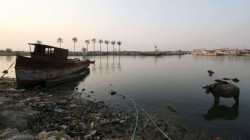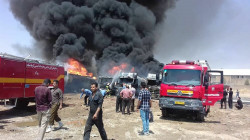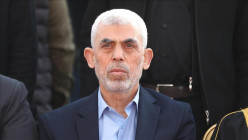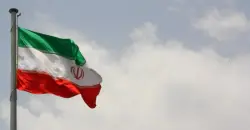Iran sentences 15 Bahá'í women to 75 years in prison

Shafaq News/ An Iranian court in Isfahan province has sentenced 15 Bahá'í women to 75 years in prison on charges of "promoting" Bahá'í beliefs. Each woman received a five-year prison term, alongside fines and additional restrictions.
The Iranian government views the activities of Bahá'í citizens, particularly in charity and education, as propaganda efforts and an ideological threat. Under Iranian law, Bahá'ís are considered a "deviant group working in favor of Israel."
Sources informed Radio Farda, a local Iranian news outlet, that “In addition to their prison terms, each of the 15 women was fined 50 million tomans (approximately $1,000), banned from leaving the country for two years, and deprived of social services for five years.”
These women were arrested on April 3 on charges of "deviant propaganda and educational activities contrary to the sacred Islamic law," according to Iranian media.
The Bahá'í International Community announced on May 7 that women followers of this faith in Iran have increasingly become targets of government attacks. Over the past two months, out of a total of 85 Bahá'í citizens summoned to Iranian courts or imprisoned, 65 individuals—approximately three-quarters of those summoned—are women.
According to the Bahá'í International Community, the wave of assaults on Bahá'í women across Iran has intensified in recent weeks, with dozens being separated from their families and facing "baseless accusations" that could lead to years of "cruelty and violence."
The Bahá'í faith, founded by Bahá'u'lláh (Mirza Husayn Ali Nuri) in the 19th century in Persia (modern-day Iran), is a relatively modern religion that “aims to achieve global unity and rejects religious, racial, and national prejudices.”
Human Rights Watch said in a report released in April condemned the Iranian authorities' decades-long “systematic repression of Baha'is amounts to the crime against humanity of persecution.”
The 49-page report, "'The Boot on My Neck': Iranian Authorities' Crime of Persecution Against Baha'is in Iran," documented Iranian authorities' systematic “violation of the fundamental rights” of members of the Baha'i community through “discriminatory” laws and policies that target them.
Human Rights Watch found that Baha'is face a spectrum of abuses. Government agencies arrest and imprison Baha'is arbitrarily, confiscate their property, restrict their education and employment opportunities, and even deny them a dignified burial, according to the report.
"Iranian authorities deprive Baha'is of their fundamental rights in every aspect of their lives, not due to their actions, but simply for belonging to a faith group," said Michael Page, deputy Middle East director at Human Rights Watch. "It is critically important to increase international pressure on Iran to end this crime against humanity."
The report drew on extensive documentation by Human Rights Watch and Iranian human rights groups regarding violations against Baha'is in Iran. Researchers reviewed government policies, court documents, and communications with Baha'is. Human Rights Watch also interviewed Baha'is remotely inside and outside Iran between May 2022 and March 2023.
Baha'is are the largest unrecognized religious minority in Iran. They have been the target of harsh, state-backed repression since their religion was established in the 19th century. After the 1979 revolution, Iranian authorities executed or forcibly disappeared hundreds of Baha'is, including their community leaders. Thousands more have lost their jobs and pensions or were forced to leave their homes or country.
Since 1979, the Islamic Republic of Iran has codified its repression of Baha'is into law and official government policy, vigorously enforced by security forces and judicial authorities. Judicial authorities interpret vague national security laws to label Baha'is an outlawed religious minority, branding them as a threat to national security. Human Rights Watch believes that this sustained systematic repression deliberately deprives Baha'is of their basic rights, constituting the crime against humanity of persecution.
The Rome Statute, the founding treaty of the International Criminal Court, defines persecution as the intentional and severe deprivation of fundamental rights contrary to international law because of "the identity of the group or collectivity," including on national, religious, or ethnic grounds. Under international law, crimes against humanity are some of the most serious crimes "committed as part of a widespread or systematic attack directed against any civilian population, with knowledge of the attack."
Court documents demonstrate authorities' characterization of the Baha'i faith as a "deviant cult" and its adherents as members of an "illegal group." Official state policies outlined in documents reviewed by Human Rights Watch explicitly bar them from employment and education opportunities, deny them pensions, and seize their property.
Baha'is who spoke to Human Rights Watch described their persecution as a series of violations that begin with their first encounters with the Iranian state and affect every aspect of their lives, including education, employment, and marriage.
"[When I left Iran to continue my education], I did not intend to emigrate," said Negar Sabet, 38-year-old daughter of Mahvash Sabet Shahriari, a prominent member of the Baha'i community currently imprisoned in Iran. She said, "But my experience at the university outside of the country was very different, as if for the first time a burden was lifted off my shoulders and the boot on my neck had disappeared … There [abroad] I experienced a strange freedom, and for the first time I was equal with other people, and no one was pulling themselves away from me.
Iranian authorities' 1991 Iranian Supreme Revolutionary Cultural Council memorandum outlines state policies systematically discriminating against Baha'is, restricting their access to jobs, education, and economic opportunities. Iranian authorities also use legal provisions to deny Baha'is employment, pensions, and benefits, alongside targeting Baha'i-owned businesses, economically strangling the community by confiscating hundreds of members' properties.
Furthermore, the Bahá'í faith has faced significant pressures in Iraq since its declaration in 1844. The situation peaked in 1970 when Law No. 105 was enacted to ban Bahá'í activities. Several decrees published in the Iraqi official gazette banned the Bahá'í religion, stripping its followers of all their properties and resulting in imprisonment, execution, and the disappearance of many during that period.





